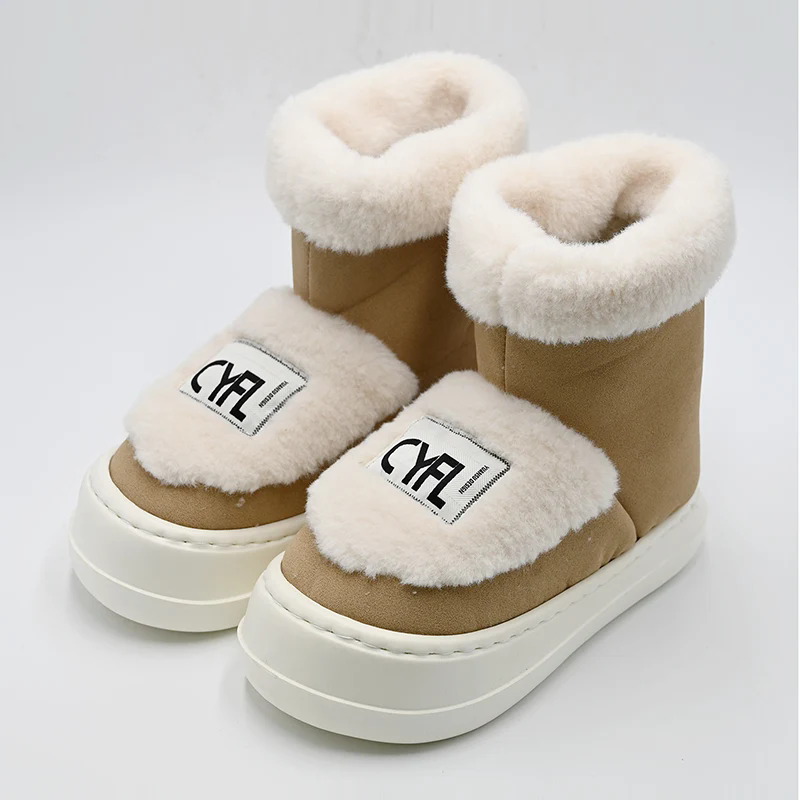- English
- Español
- Português
- русский
- Français
- 日本語
- Deutsch
- tiếng Việt
- Italiano
- Nederlands
- ภาษาไทย
- Polski
- 한국어
- Svenska
- magyar
- Malay
- বাংলা ভাষার
- Dansk
- Suomi
- हिन्दी
- Pilipino
- Türkçe
- Gaeilge
- العربية
- Indonesia
- Norsk
- تمل
- český
- ελληνικά
- український
- Javanese
- فارسی
- தமிழ்
- తెలుగు
- नेपाली
- Burmese
- български
- ລາວ
- Latine
- Қазақша
- Euskal
- Azərbaycan
- Slovenský jazyk
- Македонски
- Lietuvos
- Eesti Keel
- Română
- Slovenski
- मराठी
- Srpski језик
What Makes Snow Boots the Ultimate Choice for Winter Comfort, Protection, and Style?
Snow boots are specialized winter footwear designed to provide warmth, traction, and waterproof protection in snowy and icy environments. Built to handle extreme weather conditions, these boots combine functional engineering with comfort, ensuring that wearers stay dry and stable during outdoor winter activities. Modern snow boots go beyond basic insulation—they integrate advanced materials, ergonomic designs, and stylish finishes that align with today’s fashion and performance needs.
The primary purpose of snow boots is to create a protective barrier between the foot and the harsh elements. They feature water-resistant uppers, thick soles with deep treads, and insulated interiors that trap heat while allowing breathability. Whether walking through snow-covered streets, hiking frozen trails, or commuting in frosty conditions, snow boots are indispensable for maintaining warmth and preventing slips or moisture intrusion.
Key Features and Product Parameters
| Parameter | Description |
|---|---|
| Upper Material | Waterproof leather, synthetic fabric, or durable nylon |
| Insulation Type | Thinsulate™, wool blend, or faux fur lining |
| Outsole Material | Non-slip rubber with multidirectional traction |
| Inner Lining | Breathable fleece or thermal foam |
| Closure Type | Lace-up, Velcro, or side zipper |
| Temperature Rating | -20°C to -40°C (depending on model) |
| Weight | Lightweight design (0.8–1.2 kg per pair) |
| Color Options | Black, brown, gray, beige, and custom patterns |
| Water Resistance | Fully waterproof or water-repellent coatings |
These specifications reflect a balance between function and comfort, making snow boots suitable for both everyday wear and demanding outdoor environments.
Why Are Snow Boots Important for Winter Use?
Snow boots provide more than just warmth; they serve as a form of personal protection during harsh weather. They prevent frostbite and cold-related injuries by maintaining consistent insulation. Additionally, their slip-resistant soles help minimize accidents on icy surfaces. Unlike fashion boots or hiking shoes, snow boots are purpose-built for snow, offering a blend of flexibility and sturdiness that other footwear cannot match.
The increasing demand for snow boots stems from lifestyle changes, as more people embrace outdoor winter activities such as snow hiking, skiing, or urban commuting in cold climates. The evolution of snow boot technology has introduced features like anti-freeze rubber compounds, moisture-wicking liners, and odor-resistant treatments, transforming these boots into all-day comfort wear for diverse users.
Why Are Modern Snow Boots Gaining Popularity in Global Winter Fashion?
The appeal of snow boots has expanded far beyond their original utilitarian purpose. Today, they represent a fusion of function and fashion, becoming a staple in winter wardrobes across regions that experience cold or snowy seasons. This growing popularity can be attributed to three main factors: design innovation, material advancement, and sustainable production trends.
Aesthetic and Functional Innovation
Manufacturers are merging high-performance materials with modern aesthetics. For instance, suede finishes combined with waterproof membranes create a luxurious yet practical look. The use of color-block designs, fur trims, and ergonomic silhouettes adds a fashionable edge without compromising warmth or protection. This combination allows users to enjoy stylish footwear that performs exceptionally in severe weather.
Material Advancements and Sustainability
Eco-conscious consumers are driving the shift toward sustainable snow boots. Brands are introducing recycled polyester fabrics, biodegradable insulation, and eco-friendly adhesives. These materials reduce environmental impact while maintaining superior thermal performance. In addition, the use of vegan leathers and plant-based waterproofing technologies further demonstrates the footwear industry’s commitment to sustainability.
Global Market Trends and User Demand
The global snow boots market has witnessed consistent growth due to urbanization, increased winter tourism, and the rising influence of winter sports. Consumers are now looking for products that combine protection, lightweight design, and breathability. Advanced thermal insulations like PrimaLoft® and OutDry™ technologies are becoming standard in premium models. Furthermore, ergonomic arch support and memory foam insoles have improved the overall wearing experience, making snow boots versatile for both outdoor and daily use.
How Are Snow Boots Evolving with Technology and Future Trends?
The future of snow boots lies in the integration of intelligent design and performance-oriented innovation. As consumer expectations rise, manufacturers are focusing on enhancing durability, comfort, and adaptability through new materials and engineering techniques.
Technological Integration and Smart Design
Recent advancements include heat-reflective linings, self-drying interiors, and temperature-regulating materials. Some high-end snow boots even feature rechargeable heating systems controlled via smartphone apps. These innovations enable users to customize warmth levels and maintain comfort in fluctuating outdoor temperatures.
Improved Comfort Through Ergonomic Engineering
Future designs will prioritize foot anatomy and movement efficiency. Snow boots are now being developed with shock-absorbing midsoles, orthotic-friendly insoles, and flexible ankle support systems. These updates ensure that users can walk naturally even in thick snow, minimizing fatigue and maximizing traction stability.
Sustainable and Recyclable Manufacturing
Eco-friendly manufacturing continues to be a dominant trend. Brands are investing in closed-loop production systems, where used boots can be returned and recycled into new pairs. Additionally, the development of plant-based waterproof coatings and biodegradable insulation materials marks a significant step toward reducing environmental impact while maintaining high functionality.
Market Forecast and Consumer Insight
Market research suggests that the demand for multi-purpose snow boots—those suitable for both outdoor sports and city life—will continue to increase. The expansion of e-commerce has also made it easier for global customers to access high-quality snow boots from specialized manufacturers. As technology continues to evolve, snow boots will not only become more sustainable but also more adaptable, stylish, and performance-oriented.
Common Questions About Snow Boots (FAQ Section)
Q1: What Is the Difference Between Snow Boots and Winter Boots?
A1: Snow boots are specifically designed for wet, snowy, and icy conditions. They feature waterproof exteriors, insulated interiors, and thick non-slip soles. Winter boots, on the other hand, are more suitable for dry, cold weather and may not offer full waterproofing. If walking through deep snow or slush is expected, snow boots provide superior protection and traction.
Q2: How Should Snow Boots Be Cleaned and Maintained?
A2: To maintain snow boots, wipe off dirt and salt after each use using a damp cloth. Allow them to air-dry naturally away from direct heat sources. For leather models, apply a water-repellent conditioner to preserve the material’s durability. Fabric or synthetic versions can be cleaned with mild soap and water. Always store them in a cool, dry place to prevent odor buildup and moisture damage.
Why Happyhome Snow Boots Define the Future of Winter Comfort
Snow boots have evolved from simple protective gear to advanced winter footwear that balances warmth, safety, and modern aesthetics. They symbolize how technology and design can work together to improve comfort and environmental responsibility. With innovations such as heat-regulating linings, sustainable materials, and improved ergonomic support, snow boots will continue to redefine winter comfort across global markets.
Happyhome stands at the forefront of this evolution, offering a diverse range of snow boots that combine function, durability, and elegant design. Each pair is meticulously crafted to deliver superior insulation, non-slip traction, and stylish appeal, ensuring users can embrace winter with confidence and comfort.
For more information on product specifications, design customization, or bulk purchase inquiries, contact us to learn how Happyhome snow boots can elevate your winter experience with warmth, safety, and style.




